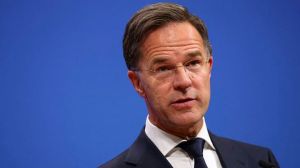Many colours on his palette
Playwright, director, actor, automation design engineer, executive producer of a CD manufacturing firm - will the real Shrirang Godbole p...

Playwright, director, actor, automation design engineer, executive producer of a CD manufacturing firm – will the real Shrirang Godbole please stand up?Godbole, however, is quite clear that theatre is his first love. Well known as an exponent of GRIPS (the German theatre group aimed at children) and for his association as writer and director with children’s theatre, he has also acted and written for television serials.
Godbole’s tryst with theatre began early. “My school, Nutan Marathi Vidyalaya, has a strong tradition of theatre and it provided the initial platform for dramatics,” he says. An association that was made stronger when Godbole joined the Theatre Academy (TA), where he came into contact with other talented theatre personalities, among them Satish Alekar and Jabbar Patel, whom he assisted in directing the play Padgham.
In 1986, Godbole, who had till then written jingles, embarked on writing his first play – Makeup. “I got the confidence I needed because the play received a warm reception, even winning the State award,” he says.
Godbole’s GRIPS connection came about quite by accident. “Mohan Agashe brought this kind of theatre to Indian audiences through the TA,” he says. Although members of the academy were initially a little skeptical about performing for children, they decided to experiment. Godbole agreed to assist German director Wolfgang Kolneder and translate the first play – Chhan Chhote Vait Mothe – a play that was given an enthusiastic reception by parents and teachers as well and ran from 1986 to 1990. The same year, it was decided to phase out the foreign content of the plays and adapt them to Indian conditions. Godbole transcribed the play from the original German and the result was Nakore Baba. “The play was a commercial success, with 156 shows in one year,” he says.
Why has Godbole been drawn to children’s theatre, a territory most theatre persons don’t usually stray into? “Strictly speaking, there’s no such thing as children’s theatre. Theatre can be meaningful to a specific age group but it should be fun at any age. It is helpful in forming one of the threads that go into making the larger core of a child’s persona. So writing for a younger, impressionable audience has its own responsibilities,” he says.
It was the dearth of meaningful theatre aimed at this age-group that made Godbole gravitate towards it. “Most children’s theatre has concerned itself with non-realistic stories, fairy tales and ghosts. These kind of plays only instill a fear of the unknown in children’s psyche, whereas plays should actually help dispel fear. Theatre serves the important function of nurturing,” he feels.
This explains why Godbole has touched on the theme of the Hindu-Muslim riots that shook Mumbai, in his play Pan Amhala Khelaychay, written in 1997. It explores how the adult divide among the religious communities was thrust on the children as well. Godbole dismisses the idea that the theme is too `grown-up’ for children to handle. “The play was based on a true incident where it was found that parents of Muslim children were withdrawing their children from schools which had a majority of Hindu school-going children. Theatre of this kind is a reflection of reality,” he says.
Creativity cannot be limited to one area alone. So Godbole has also acted in serials and has ventured into writing for television. “I am currently engaged in an ambitious youth-related serial for UTV. Theatre is an effective medium but it has its limitations so I would like to make a film,” he says.
In between creativity workshops for children and the corporate sector, Godbole is also squeezing in time to create a club in Mundhwa which will be a venue for jazz events and music training besides being an executive producer of a CD manufacturing and animation production house.
Godbole finds a definite link of design between his dramatic vocation – which he believes is an aesthetic rearrangement of facts – and his profession of an automation design engineer. Nothing though can keep him away from touching on his pet subject. “There is a need to go away from the proscenium kind of theatre to a smaller, more intimate kind which is interactive. Theatre should offer more than just entertainment, it should be able to communicate.” Something Godbole feels he is best at.





- 01
- 02
- 03
- 04
- 05


























